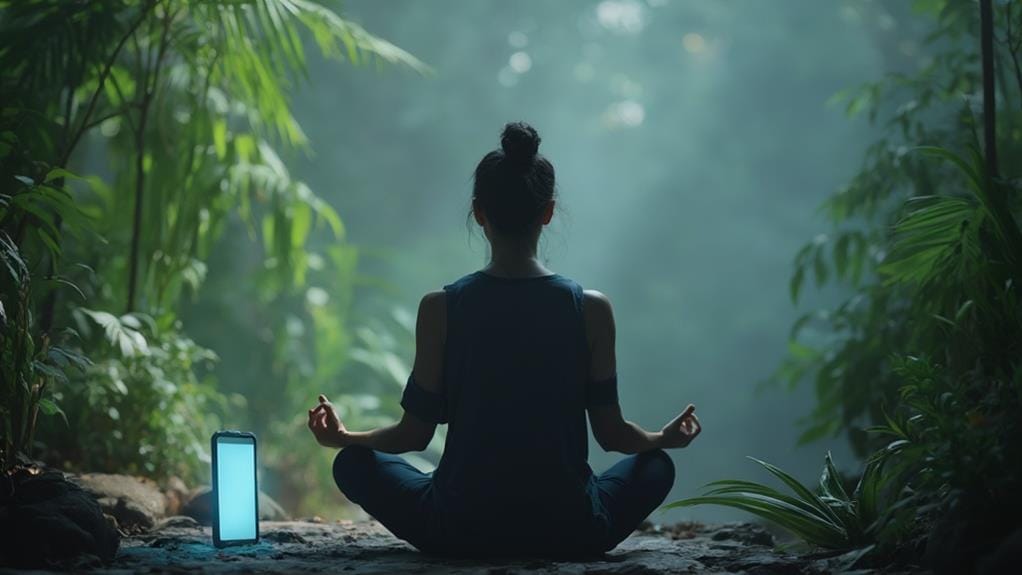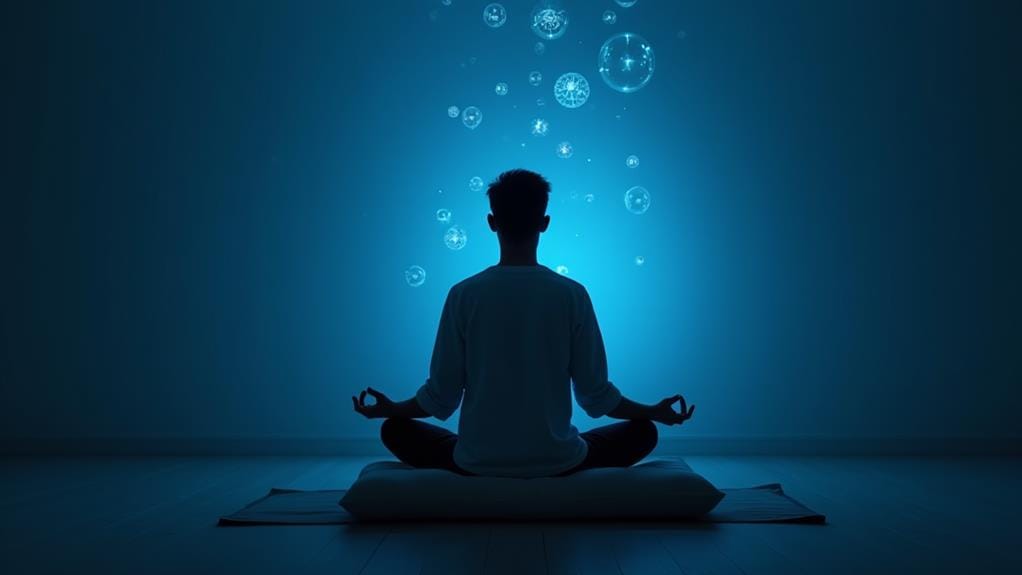

Transform your social media experience by embracing mindful engagement and setting clear boundaries. You'll boost your mental well-being by limiting daily usage to 30 minutes, curating positive content, and establishing tech-free zones. Start with a "pause and reflect" approach before posting or scrolling, and prioritize face-to-face connections over digital interactions. Create a "digital sunset" routine by avoiding screens before bedtime, and use the "Do Not Disturb" feature during important activities. Track your social media habits in a journal to understand their impact on your mood. There's so much more to discover about mastering your digital wellness journey.

In today's digital landscape, scrolling through social media has become second nature, but practicing mindful engagement can transform your online experience from mindless consumption into meaningful connection.
When you're aware of your thoughts and feelings during social media use, you'll discover a deeper understanding of how these platforms affect your mental well-being. One way to foster this awareness is by initiating conversations and encouraging user participation that resonates with your audience, leading to more engaging and fulfilling interactions.
Start by setting clear intentions before you open your favorite apps. Ask yourself: What am I hoping to achieve? Who do I want to connect with? This simple practice helps you maintain healthy social media habits and avoid the endless scroll that often leads to anxiety or loneliness.
You'll find that limiting your daily usage to 30 minutes or less can notably boost your mood and overall satisfaction.
Creating a positive online environment is equally important. Take control of your feed by following accounts that spark joy and inspire growth.
When you notice yourself feeling triggered or overwhelmed, pause and check in with your emotions. Remember, mindful engagement isn't about perfection – it's about staying present and making conscious choices that support your mental wellness every time you log in.
While mindful social media engagement helps us navigate the digital world, strengthening our real-world connections deserves equal attention.
You'll find that prioritizing face-to-face interactions and real-time conversations can notably enhance your emotional well-being and create deeper bonds that healthy social media platforms simply can't replicate. Consider leveraging platforms like LinkedIn's professional network to connect with local professionals and arrange in-person meetups.
Additionally, joining local clubs or community groups that align with your interests can provide authentic opportunities to develop meaningful relationships and reduce your dependence on digital communication. When you're catching up with friends, opt for a phone call or video chat instead of typing out messages. You'll be amazed at how much more fulfilling these real-time interactions can be!
Remember that social media should complement your real-world connections, not replace them. If you're feeling lonely despite countless online interactions, it's time to shift your focus.
Your mental health benefits notably when you nurture in-person relationships. Make it a point to schedule regular face-to-face meetups with friends and family. These genuine interactions will create lasting memories and strengthen your support system in ways that social media likes and comments never could.

Setting clear boundaries around social media usage can transform your digital wellness journey. When you're intentional about your time use, you'll discover that less scrolling actually leads to more fulfillment. Start by limiting your daily social media engagement to under 30 minutes – you'll be amazed at how this simple change can boost your mood and reduce anxiety.
Additionally, consider using automation tools to schedule your social media interactions during designated times. This approach not only saves time but also guarantees a more focused engagement during peak activity hours.
Your digital devices come equipped with powerful tools to help you maintain healthy social media habits. Take advantage of "Do Not Disturb" settings during focused work periods, and create designated time blocks for checking your feeds.
Think of these boundaries as your personal wellness guardrails, not restrictions. By monitoring your daily patterns, you'll quickly spot those sneaky scroll sessions that eat away at your precious time.
Make tech-free zones a non-negotiable part of your routine, especially during meals and bedtime. You'll sleep better, connect more deeply with others, and find yourself naturally gravitating toward more meaningful activities.
Transform your social media experience by becoming an intentional curator of your digital space. Just as you'd carefully choose the art for your home, it's vital to thoughtfully select the content that fills your daily feed.
When you're mindful about curating positive digital content, you'll create an environment that uplifts and energizes rather than drains you. Including strategies like using local hashtags can enhance your connection with the community and improve engagement. Your mental health directly benefits from positive social media interactions.
Start by unfollowing accounts that don't serve your well-being and actively seek out content that aligns with your values and interests. Use wellness-focused hashtags to discover uplifting posts and connect with like-minded individuals who share your passion for personal growth.

A good night's sleep begins with mindful digital habits. In today's Digital World, your screen time can make or break your sleep quality. You'll find that creating a buffer zone between your social media usage and bedtime isn't just helpful – it's essential for your well-being.
| Sleep-Friendly Actions | Benefits |
|---|---|
| Turn off devices 1 hour before bed | Supports natural melatonin production |
| Enable "Do Not Disturb" mode | Prevents disruptive notifications |
| Create a device-free bedroom | Promotes better sleep environment |
| Maintain consistent sleep schedule | Regulates your body's internal clock |
| Replace scrolling with reading | Reduces anxiety and stress levels |
Let's be real – you're probably tempted to check those late-night notifications, but your sleep matters more than those midnight memes. By setting boundaries with your digital devices, you're investing in better rest and mental clarity. Think of it this way: your brain needs time to wind down from the stimulation of social feeds. When you protect your sleep through digital wellness practices, you're not just improving your nights – you're upgrading your entire day. Make the choice to disconnect before bedtime, and watch your sleep quality soar.
Your mindful approach to nighttime digital habits naturally extends into managing your daily notification flow. When you take control of your notifications, you're creating a healthier relationship with social media platforms.
Start by disabling non-essential alerts and watch how quickly your stress levels drop. You'll find yourself more present and focused throughout your day when you're not constantly reaching for your phone.
Setting boundaries around time spent on social media doesn't have to feel restrictive. Schedule specific check-in times and use your phone's "Do Not Disturb" feature to protect your focus during important activities.
Let friends and family know about your new approach – you'll be surprised how understanding they'll be!

Digital connections sparkle with new meaning when you focus on quality over quantity.
It's time to transform your social media habits into purposeful interactions that truly matter. Start by prioritizing real-time conversations through video calls or phone chats – they're like digital bridges that connect hearts more effectively than a string of emoji[2] reactions.
You'll discover that healthy social media platforms aren't just about scrolling endlessly. They're about creating genuine connections.
When you engage with diverse perspectives, you're building a richer, more meaningful online community.
Think of your feed as your digital garden – plant positivity by following accounts that inspire you, and don't hesitate to prune away content that drains your energy.
Becoming mindful of your online presence starts with understanding how social media affects your emotional well-being. Digital self-awareness isn't just about tracking your screen time – it's about developing a deeper understanding of how your online interactions shape your mood and behavior.
When you keep a journal of your social media use, you'll start noticing patterns that influence your emotional state.
Take control of your digital well-being with these powerful strategies:
Your relationship with social media doesn't have to be complicated. By approaching your online time with intention and awareness, you'll create a more positive digital experience.
Remember to check in with yourself regularly and assess how different types of content make you feel. Think of it as spring cleaning for your digital life – keep what serves you and let go of what doesn't.

In today's fast-paced digital world, maintaining a healthy relationship with social media requires deliberate attention to your mental well-being. You'll find that limiting your daily scrolling to just 30 minutes can dramatically boost your mood and reduce anxiety. It's time to take control of your digital habits and create boundaries that work for you.
| Strategy | Benefit | Action Step |
|---|---|---|
| 30-Min Rule | Improved mood | Set daily timer |
| Digital Sunset | Better sleep | No screens before bed |
| Reality Check | Enhanced connections | Plan in-person meetups |
When you're feeling overwhelmed by social media platforms, don't hesitate to take a break. Whether it's a few days or a week, stepping away can help you reset and gain perspective. You'll be amazed at how much clearer your mind feels when you prioritize real-world connections over digital ones. Try monitoring your emotional responses to different platforms and notice what triggers negative feelings. Remember, it's perfectly okay to unfollow accounts that don't serve your mental health. By making conscious choices about when and how you engage with social media, you're investing in your long-term emotional well-being.
Taking regular breaks from social media goes beyond simple mindfulness—it's a powerful step toward reclaiming your time and energy.
With the average person spending nearly two and a half hours daily scrolling through social media platforms, you've got a unique opportunity to transform your digital habits into a healthier routine.
Research proves that limiting social media usage to just 30 minutes a day can greatly boost your mental health and overall well-being.
You'll be amazed at how establishing structured breaks can revolutionize your relationship with healthy social media platforms.
Start by recognizing the signs that indicate you need a digital timeout, then implement these game-changing strategies:
You'll find balance through digital detox periods, mindful engagement with your favorite content, and thoughtful content curation. Set time limits, follow uplifting accounts, and don't forget to disconnect for real-life connections.
You'll achieve social media wellness by: starting with a digital detox, practicing mindful scrolling with clear intentions, fostering positive engagement through curated content, and maintaining regular breaks to protect your mental well-being.
You're probably scrolling right now! Practice mindful scrolling by setting time limits, engaging with positive content, taking regular digital detox breaks, and connecting authentically with friends. It'll make your social media experience more meaningful.
You can boost health through social media by joining community support groups, sharing digital detox tips, promoting mental health awareness, and connecting with others who're working toward similar wellness goals.
